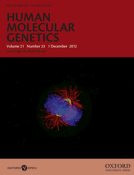
HUMAN GENETICS
Scope & Guideline
Unveiling the complexities of human genetics.
Introduction
Aims and Scopes
- Human Genetic Variation:
The journal covers studies on genetic variations in human populations, including single nucleotide polymorphisms (SNPs), copy number variations, and structural variants, exploring their associations with phenotypic traits and diseases. - Genomic Medicine and Clinical Applications:
Research articles focus on the translation of genetic findings into clinical practice, including genetic testing, variant interpretation, and the implications of genomic information for patient care. - Complex Trait Genetics:
The journal explores the genetic architecture of complex traits through genome-wide association studies (GWAS) and polygenic risk scores, aiming to identify genetic factors contributing to multifactorial diseases. - Population Genetics and Ethnic Diversity:
Studies on population genetics, including ancestry, migration patterns, and the genetic diversity of different populations, are central to the journal's scope, reflecting on how these factors influence health outcomes. - Functional Genomics and Mechanisms of Disease:
The journal emphasizes functional studies that elucidate the molecular mechanisms underlying genetic disorders, including gene expression, regulatory variants, and the impact of non-coding regions on disease. - Ethical, Legal, and Social Implications of Genomics:
Research discussing the ethical, legal, and social implications of genetic research and testing, including issues related to consent, privacy, and the impact of genetic knowledge on individuals and communities.
Trending and Emerging
- Integration of Multi-Omics Approaches:
There is a growing trend towards integrating various omics layers, such as genomics, transcriptomics, and proteomics, to gain comprehensive insights into complex diseases and biological processes. - Artificial Intelligence and Machine Learning in Genetics:
The application of AI and machine learning techniques for genetic data analysis, variant classification, and predictive modeling is on the rise, showcasing the potential for enhanced discovery and clinical utility. - Gene-Environment Interactions:
Research exploring the interplay between genetic predispositions and environmental factors is gaining traction, emphasizing the complexity of disease etiology and the importance of context in genetic research. - Ethics and Social Implications of Genomics:
There is an increasing focus on the ethical, legal, and social implications of genetic research, particularly regarding issues of equity, access to genomic medicine, and the impact of genetic information on diverse populations. - Advancements in Genetic Technologies:
Innovations in genetic technologies, such as CRISPR gene editing, long-read sequencing, and advanced bioinformatics tools, are being extensively discussed, reflecting their transformative potential in research and therapy.
Declining or Waning
- Traditional Genetic Mapping:
There is a noticeable decrease in studies solely focused on traditional genetic mapping approaches, such as linkage analysis, as more sophisticated methods like whole-genome sequencing and multi-omics analyses become prevalent. - Single Trait Mendelian Disorders:
Research specifically targeting single-gene Mendelian disorders appears to be less frequent, potentially overshadowed by broader investigations into polygenic and multifactorial conditions. - Basic Genetic Epidemiology:
While foundational studies in genetic epidemiology remain important, there is a shift towards more integrative approaches that combine genetic, environmental, and lifestyle factors, leading to a decline in standalone epidemiological studies. - Narrowly Defined Genetic Risk Factors:
Research focusing on isolated genetic risk factors without considering broader genomic context or interactions is waning, as the field increasingly adopts a more holistic view of genetics.
Similar Journals

Human Gene
Pioneering Research in Genetics and HealthHuman Gene is an innovative open access journal published by ELSEVIER, dedicated to the ever-evolving field of genetics. Established in 2022, this journal serves as a vital resource for researchers, professionals, and students alike, aiming to facilitate the dissemination of groundbreaking research and advancements in both basic and clinical genetics. With an ISSN of 2773-0441, Human Gene focuses on providing a platform for high-quality studies that investigate genetic mechanisms, their implications in health and disease, and novel therapeutic strategies. The journal currently holds a Q4 ranking in both Genetics and Clinical Genetics categories, reflecting its emerging status within the scientific community, and strives to enhance its impact to better serve an engaged audience. With its base in Amsterdam, Netherlands, Human Gene is committed to making research accessible through its open access model, inviting contributions that advance our understanding of human genetics and foster collaboration across disciplines.

Cancer Genetics
Unlocking the Secrets of Cancer Through GeneticsCancer Genetics is an esteemed peer-reviewed journal dedicated to advancing the field of cancer research through the lens of genetics. Published by Elsevier Science Inc and available in both print (ISSN: 2210-7762) and online (E-ISSN: 2210-7770), this journal aims to provide a platform for the dissemination of high-quality studies that unravel the genetic underpinnings of cancer. Since its inception in 2011, Cancer Genetics has become a significant resource for researchers, professionals, and students with a shared interest in understanding the intricate relationship between genetics and oncogenesis. With an impact factor that reflects its influence, the journal has maintained a Q3 ranking in Cancer Research, Genetics, and Molecular Biology as of 2023, indicating its growing importance in these fields. Additionally, the journal offers open access options to ensure that crucial findings are easily accessible to the global research community. By bridging the gap between genetics and cancer studies, Cancer Genetics plays a pivotal role in fostering innovation and collaboration among scientists and clinicians striving to improve cancer diagnosis and treatment.

JOURNAL OF GENETICS
Fostering Innovation in Genetic ScienceJOURNAL OF GENETICS, published by the Indian Academy of Sciences, is a pivotal platform for researchers and scholars in the field of genetics. With its long-standing history dating back to 1910, this journal has consistently contributed to the academic discourse through the rigorous publication of original research, reviews, and case studies. Despite its current classification in the Q4 quartile for the 2023 metrics in Genetics, the journal plays a critical role in advancing our understanding of genetic principles, experimental methodologies, and innovations. Spanning a diverse array of topics, the journal aims to foster scholarly exchange and collaboration within the global genetics community. For researchers aiming to publish their work, accessing the journal’s comprehensive archives, which include publications from as early as 1910 to the present day, offers a valuable perspective on the evolution of genetic research. As it continues to adapt to the changing landscape of scientific inquiry, JOURNAL OF GENETICS remains a significant resource for students, professionals, and academics dedicated to exploring the complexities of genetics.

GENETIC EPIDEMIOLOGY
Pioneering Research at the Intersection of Genetics and EpidemiologyGENETIC EPIDEMIOLOGY is a pioneering journal published by Wiley that bridges the fields of genetics and epidemiology to advance our understanding of the genetic underpinnings of health and disease. Established in 1984 and converging into its 40th year of impactful research in 2024, this journal offers a key platform for the dissemination of innovative research findings, statistical methods, and applications in both clinical genetics and epidemiological practices. With a robust presence in Scopus, ranking in the second quartile (Q2) for both epidemiology and clinical genetics, it enjoys a significant reputation among its peers. The journal does not currently offer open access, but it is vital for researchers, professionals, and students committed to exploring the evolving landscape of genetic influences on population health. Its rich repository of studies not only enhances knowledge but also informs public health policies and clinical practices worldwide, making it an indispensable resource for those seeking to innovate and apply genetic research in the quest for better health outcomes.

HUMAN MOLECULAR GENETICS
Charting new territories in clinical genetics.HUMAN MOLECULAR GENETICS, published by Oxford University Press, is a premier journal in the field of genetics, with an established reputation since its inception in 1992. With an impressive Q1 ranking in various categories, including Genetics, Clinical Genetics, and Molecular Biology, this journal engages a diverse readership by reporting significant advances in our understanding of the genetic basis of human health and disease. The journal has achieved notable rankings within Scopus, particularly in Clinical Genetics, making it a key resource for professionals and researchers aiming to stay at the forefront of genetic research. Although it operates under a traditional access model, it remains committed to disseminating high-quality research that informs clinical practice and enhances knowledge in the genetic field. The journal's impact factor signifies its crucial role in shaping contemporary genetic research and its application in medicine. As the field continues to evolve, HUMAN MOLECULAR GENETICS serves not only as an academic repository but also as a vital platform for innovation and discussion among students, researchers, and clinicians.

INTERNATIONAL JOURNAL OF HUMAN GENETICS
Connecting Research and Discovery in Human GeneticsINTERNATIONAL JOURNAL OF HUMAN GENETICS is a distinguished publication dedicated to advancing knowledge in the fields of genetics and molecular biology. Published by KAMLA-RAJ ENTERPRISES, this journal explores critical developments and research findings from 2008 to 2016, though its coverage in Scopus has since been discontinued. With an ISSN of 0972-3757 and an E-ISSN of 2456-6330, the journal aimed to foster scholarly dialogue and serve as a resource for researchers, professionals, and students engaged in human genetics. While the journal holds a modest ranking in categories such as Biochemistry and Genetics, it remains a vital source for exploring niche topics within the realm of human genetics. Researchers interested in genetic screening, gene therapy, and clinical genetics will find valuable insights herein. Despite its pause in indexing, the journal continues to contribute to the academic discourse by disseminating critical research that bridges gaps in understanding human genetics.

npj Genomic Medicine
Empowering Global Collaboration in Genomicsnpj Genomic Medicine is a leading open-access journal published by NATURE PORTFOLIO, specializing in the rapidly evolving areas of genomic medicine, including genetics, molecular biology, and clinical applications. Launched in 2016, the journal has quickly established itself within the academic community, boasting a prestigious Q1 ranking in multiple categories, including Genetics and Molecular Biology, with remarkable positions in both Scopus ranks and percentiles. With an emphasis on innovative genomic research that bridges the gap between laboratory findings and clinical implementation, npj Genomic Medicine aims to provide a platform for researchers, professionals, and students to share significant advancements and insights. Being an open-access journal enhances accessibility to cutting-edge research, ensuring that vital discoveries in genomics can benefit a global audience and facilitate interdisciplinary collaboration. The journal continues to contribute to the forefront of genomic research, impacting both academic scholarship and practical healthcare solutions.

Genetics Research
Advancing Knowledge in Genetics and Molecular BiologyGenetics Research, published by HINDAWI LTD, is a distinguished open access journal that has been at the forefront of genetic studies since its inception in 1960. With the transition to open access in 2019, this journal has expanded its accessibility, fostering knowledge dissemination across the global scientific community. Operating out of the United Kingdom, it provides a platform for innovative research in the fields of genetics and molecular biology, encompassing a broad range of topics that are highly relevant to medical sciences. As of 2023, it holds a Q4 classification in Genetics and a Q3 classification in miscellaneous Medicine, reflecting its ongoing commitment to scholarly excellence amidst shifting academic landscapes. While the journal's H-index remains unlisted, its indexed ranking within Scopus, with a rank of #325/328 in the Genetics category highlights the challenges ligated to its niche audience. Nevertheless, it serves as a crucial resource for researchers, professionals, and students eager to contribute to and stay informed on the latest genetic research trends and breakthroughs.

Genetic Testing and Molecular Biomarkers
Advancing the Future of Genetic Research.Genetic Testing and Molecular Biomarkers, an esteemed journal published by MARY ANN LIEBERT, INC, serves as a pivotal platform for advancing the field of genetic research and its applications in medicine. Focused on the innovative intersections of genetics and biomarker discovery, this journal has consistently contributed meaningful insights since its inception in 2009, with its scope evolving through 2024. With an ISSN of 1945-0265 and an E-ISSN of 1945-0257, it offers both traditional and open access options to cater to a broad audience of researchers, professionals, and students. Despite its current classification in the Q4 and Q3 quartiles for Genetics (clinical) and Medicine (miscellaneous) respectively, the journal remains committed to publishing high-quality, peer-reviewed articles that push the boundaries of knowledge in the field. As the landscape of genomic medicine continues to expand, Genetic Testing and Molecular Biomarkers is positioned as a crucial resource for disseminating cutting-edge discoveries and fostering interdisciplinary collaboration.

GENES & GENETIC SYSTEMS
Empowering Discoveries in Genetics and MedicineGENES & GENETIC SYSTEMS, an esteemed journal published by the Genetics Society of Japan, serves as a vital platform for the dissemination of innovative research within the fields of genetics, molecular biology, and medicine. Established in 1996 and based in Mishima, Shizuoka, Japan, this journal has actively contributed to the academic community, fostering collaboration and knowledge sharing among researchers and professionals. The journal’s impact can be seen through its category quartiles, which reflect its position in Genetics, Molecular Biology, and Medicine, and while it currently ranks in Q4 in Genetics and Q3 in Medicine (miscellaneous), it is poised for growth as it continues to publish pivotal studies. With a commitment to open access, GENES & GENETIC SYSTEMS ensures that research findings are freely accessible to the global scientific community, promoting a more inclusive approach to knowledge distribution. This journal is essential for students, researchers, and professionals seeking to stay informed of advancements in genetic research and its implications for the broader field of medicine.